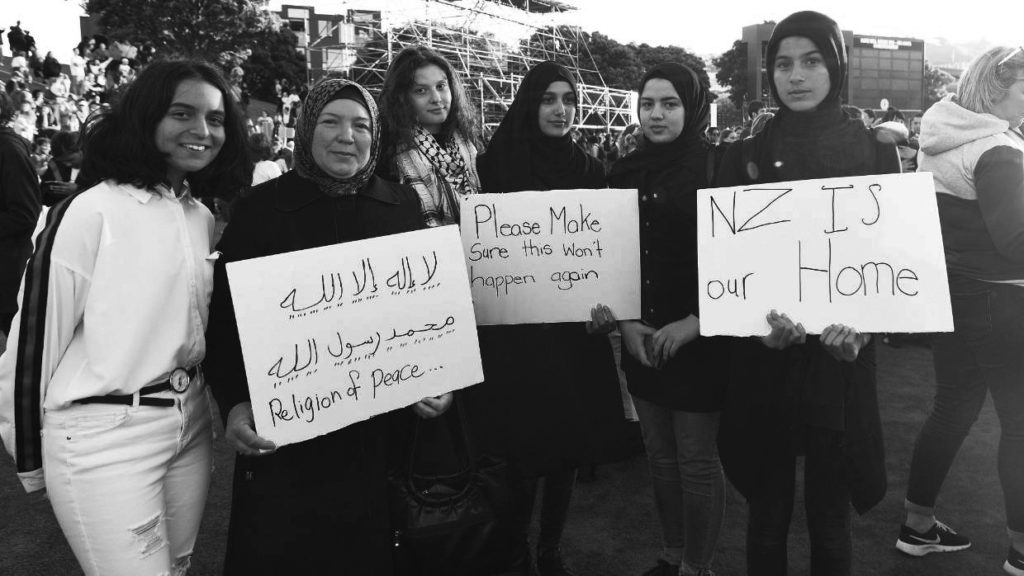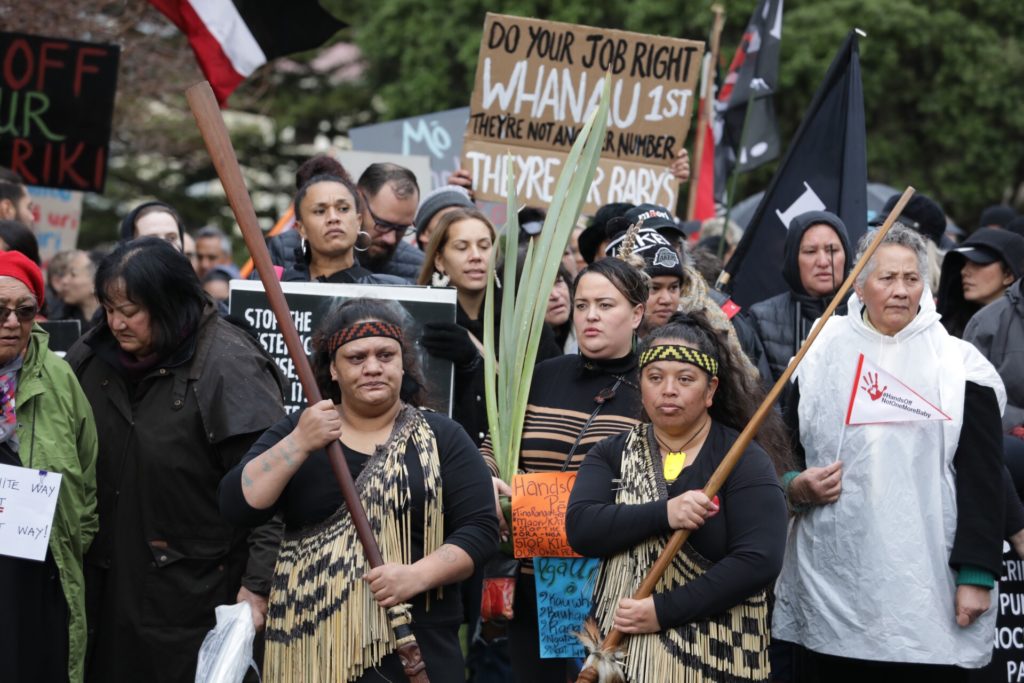The Politics of Hate: Racism and Islamophobia in NZ Today

This talk was presented to the Pōneke branch of the ISO on 17 March 2020 by Romany Tasker-Poland, a teacher, trade unionist, and member of the ISO. We are speaking about a year after the massacre at the mosques in Christchurch, as commemorations are being held. Every day is bringing out more information about this […]
India Today: Fault Lines

The twenty-third and twenty-fourth of February remain etched in the Delhi residents’ memories. The spirit of secularism and acceptance, the vibrant ethos of the nation’s most politically active city, the site of numerous progressive struggles of the working class, students, women and the like was violated and destroyed by a politically motivated fanatical violence against […]
Aboriginal Society, European Invasion, and the Bushfire Disaster

Now even right wing politicians are talking about using traditional Aboriginal land management techniques to mitigate fire risk. But pre-Invasion land management wasn’t about logging and clearing land for profit: it combined knowledge of land with collective, egalitarian planning. This summer, we have looked through the gates of hell at the apocalyptic result of the […]
Indigenous Sovereignty and Socialism

A review of Valerie Lannon and Jesse McLaren, Indigenous Sovereignty and Socialism (Toronto: Resistance Press, 2018). The epic struggle of Wet’suwet’en against the state and Coastal Gaslink playing out currently gives this title a special relevance. The Canadian state, like the New Zealand, has a wholly undeserved reputation for liberality and ‘generosity’ when it comes […]
新西兰为何如此反华?

ISO member, Brandon Johnstone, recently wrote about the history of anti-Chinese racism in New Zealand. The translation republished below was kindly done by Chinese socialists for the International Red Newsletter. Read the English version here. 发源于中国武汉的新型冠状病毒的传播,已造成大量中国公民的死亡。当病毒与其诱发的死亡越出中国国境,世界范围内产生如此之多的恐慌情绪是不难理解的。然而,被媒体放大的疫情所引发的,并非仅仅是对新型传染病的恐慌,还有早已存在的反华仇恨的重新兴起。 伴随着播报死亡人数、配以戴口罩的华人图片的头条新闻的,是关闭边境口岸、驱逐中国公民的呼吁,诸如“病毒是中国政府的武器”这样阴谋论,以及将不卫生的中国食物、中国人民归咎为罪魁祸首的强烈指责。尽管种族主义者通常声称,他们的观点是基于某些有经验事实根据的文化差异,但真相是,反华元素从十九世纪末期开始就存在于新西兰这片土地上。这些元素形成于中国移民抵达新西兰时的经济地位,也在新西兰和澳大利亚政府历史上对待中国移民的举措中不断恶化。 1861年的奥塔哥(Otago)金潮是新西兰最大的淘金潮。来自世界各地,特别是英国和美国的劳工都被赚取财富的渴望吸引而来。奥塔哥地区及地方经济逐渐繁荣,棚户区和华人村也发展起来。不过,由于竞争日益激烈,经济繁荣仅仅持续了短暂的时间。到了1860年中期金矿产量下降后,为了获取越发稀缺的黄金资源,劳工的工作时间也必须被延长。为了延续经济繁荣,新西兰政府邀请了中国大陆劳工前往残存的金矿劳作,截至1869年有超过2000名中国劳工移民到新西兰。引进华人劳工参与竞争的做法,在不同族裔劳工之间划出了一条泾渭分明的界线:英美裔劳工认为华人劳工是他们失去(淘金)前景原因。 在迅速增长的反华情绪,以及华人比白人更加吃苦耐劳、遵纪守法这样的观念之间,冲突出现了。新西兰政府受到压力,要对未来可能发生的华人经济威胁斩草除根。由此,在1881年,新西兰政府参考邻国澳大利亚的做法,建立了《华人移民法案》。这部法案是新西兰第一部限制特定人群移民的法案,也是后来被称为“白种新西兰政策”(White New Zealand Policy)的、长达五十年之久的种族主义移民法案的开端。该法对每名入境的华人收取十镑人头税;入境轮船每运载10吨货物,才能运载1名华人。在接下来的十五年里,课税愈演愈烈,甚至可以达到一名普通华工十年薪水之多。在这一时期,许多专门针对印度人、萨摩亚人、犹太人和其他移民的法律也被制定出来,但没有一个族群像华人这样受到如此特殊的对待。 媒体和政府用许多令人生厌的刻板印象来描述华人移民:不讲道德,骗子,鸦片瘾君子,以及天花携带者。政治家们宣称尽管华裔工人听话又勤劳,但不应当欢迎他们成为移民,因为他们在专制政府(清王朝)的受压迫环境下长大,不适宜参与新西兰自由的政府治理(公共生活)。华工也往往被视为纯粹的廉价劳动力——这不仅是因为他们在掘金业中主要从事体力劳动,更因为在澳大利亚他们被看作囚犯劳工的替代品,社会地位极其低下。新西兰的白人工人被鼓励将华工的竞争视为对他们薪酬和就业的威胁。但随着时间的推移,华人也同样被看作市场竞争中的威胁。这是因为,与日益增长的反华情绪同时出现的,还有蓬勃兴起的华人小资产阶级,白人小资产阶级普遍认为他们对自己的市场占有和利润构成了挑战。当然,对其他非华人移民来说,这种竞争关系也并不会少。但是,商业领域的竞争威胁与反华法案、反华政治宣传相互叠加,使得华人这一群体承受了最为深重的责难。 自二十世纪初到二十世纪五十年代之间,几个强硬的白人至上主义团体被组建起来,其中包括反亚裔联盟(the Anti-Asiatic League)、反华裔联盟(the Anti-Chinese League)、白种新西兰联盟 (the White New Zealand League)、白种人联盟( the White Race League)。这些组织致力于扩展已经存在的反亚裔法案,并成功地向与他们基本上共享“华人比白人低人一等”这一观念的统治阶级表达了这种呼吁。遍布新西兰的白人至上主义观念鼓励了这些种族主义团体,而这种观念又因为对新西兰成为“南半球不列颠”的期待而不断壮大。尽管白种新西兰联盟中的许多主要参加者都默默无闻,退伍军人协会(the RSA)与遍布新西兰的民族主义团体仍然维系了白人至上主义梦想的生命力。他们支持着小资产阶级农民的诉求——为了白种新西兰农民的利益没收所有亚裔的土地。在这一时期,刻意被激起的恐惧感从来没有真正消散过,特别是这样一种恐慌——因为移民和通婚,新西兰将丧失其纯正欧洲文化堡垒的地位。这类白人至上主义观念,并不与某一特定阶级或经济职能相联系。毋宁说,任何想要从社会层面对那些根源于劳动力的资本主义剥削的经济焦虑进行的认知,都会让位于更加直接的、非理性的指责——“(这些问题)因为华人才存在”。华人作为无产阶级甚至小资产阶级暴力行动与组织化的避雷针,使得占据统治地位的资产阶级,以及他们建构的白人至上主义意识形态从中受益。华人劳工作为替罪羊,将人们的视线从资本家攫取利润的剥削行为转移开来。 政府、媒体和种族主义组织的政治宣传,为那些可以成为反华武器的政治观点和花言巧语大开窗口。具有亚裔血统的人,有时被刻画为彻底的怪兽,有时又在讽刺漫画中被画成令人恐惧的、畸形的、鬼鬼祟祟的、作恶多端的存在。西方国家的政治宣传里,常常会有辛苦劳作的华人或日本人的讽刺漫画,暗示着西方人花费更多时间休息,以及罢工。这里的言外之意是,除非全心全意献身于生产劳动,否则国家会有被境外势力颠覆的危险。 […]
Why is New Zealand so Sinophobic?

The spread of a new Coronavirus, originating in Wuhan, China, has resulted in the deaths of many Chinese citizens. Understandably this has caused anxiety throughout the world as the virus and associated deaths have spread beyond China’s borders. The response to this outbreak amplified by the media has not only been fear of a new […]
A review of Tina Ngata’s Kia Mau: Resisting Colonial Fictions

Tina Ngata of Ngāti Porou has recently published Kia Mau: Resisting Colonial Fictions. At the launch of this book on 28th November 2019, Tina Ngata described how she had started with a blog called The Non-plastic Māori, exploring “the experience of living for a year without purchasing any new plastics”, which quickly developed to explore […]
Land is the Price: colonialism then…and now

Throughout history capitalists has searched the world for profitable exploitation. To create a paradise for capital, lands were sought, claimed and the people that lived there forced off their communal property. Those commoners then became the pool of labour that the industrial revolution was built on. From the enclosing of the commons in Britain to […]
Ihumātao: a Struggle for Justice

The fight for land rights in Aotearoa is the essential question for radical social change for both mana whenua and tau iwi. To resolve this question requires challenging some of the most fundamental aspects of capitalism in New Zealand – the rule of private property. Property held purely for profit, for factories, for land farming […]
State ‘care’ and stolen generations

“Oranga Tamariki told me I had five minutes to say goodbye to my baby and then they were going to take it… I hung onto my baby but I was worried they were going to hurt me and the baby.” These are the words of a young mother who in May resisted multiple attempts by […]


